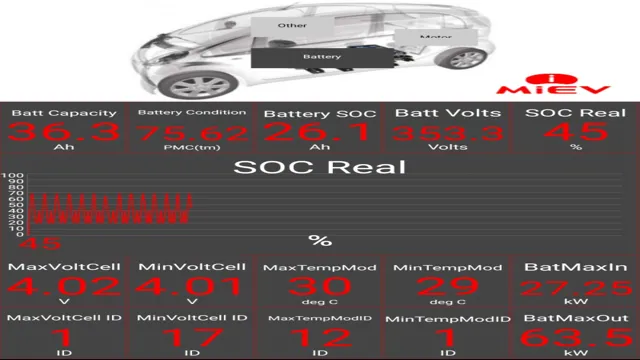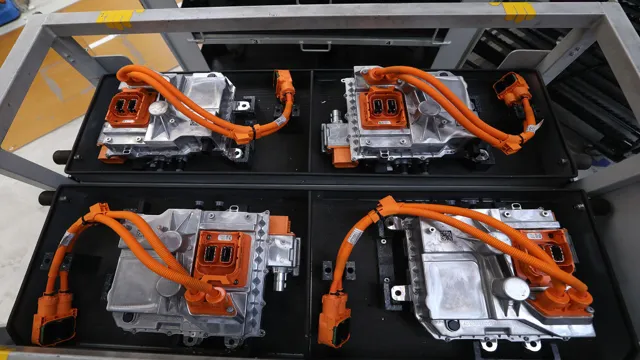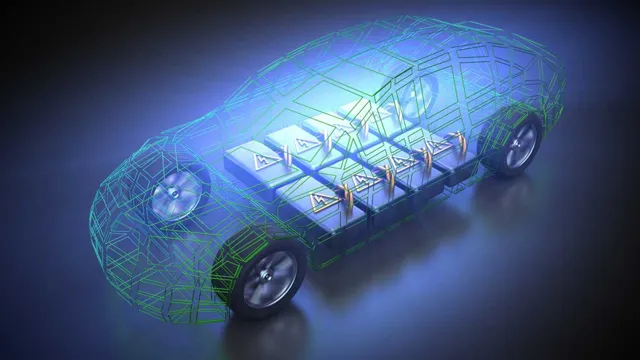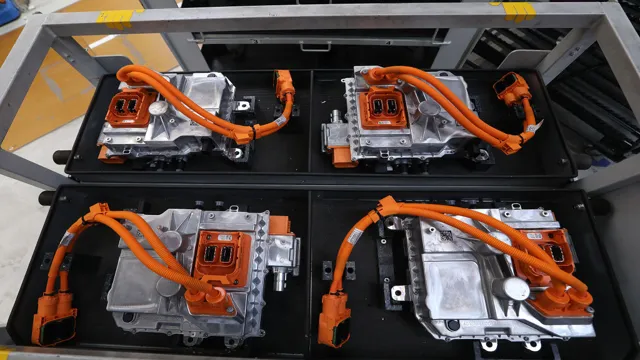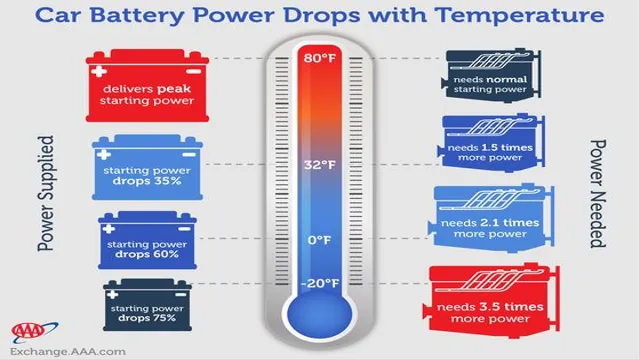Electric Car Battery vs Gasoline Car: Which One is More Efficient and Eco-Friendly?
When it comes to purchasing a car, there are several factors to consider. Among the most important is the type of battery the car uses. You may have heard about electric cars and their batteries, but how do they differ from normal car batteries? In this blog post, we’ll explore the differences between electric and normal car batteries, highlighting the pros and cons of each type.
So, buckle up and let’s get started!
Environmental impact
When it comes to the environmental impact of electric cars versus normal cars, one of the main factors to consider is the battery. Electric car batteries have come a long way in recent years and are becoming more efficient and environmentally friendly. In fact, many electric car batteries can be recycled and repurposed once they have reached the end of their life.
On the other hand, traditional car batteries are often made from lead and acid, which can be harmful to the environment both during production and when they are disposed of. Additionally, normal cars emit harmful pollutants such as carbon dioxide and nitrogen oxide, whereas electric cars emit zero emissions while driving. While there is still a long way to go to minimize the environmental impact of transportation, switching to electric cars can be a positive step in the right direction.
Electric cars have lower carbon emissions
Electric cars have lower carbon emissions compared to gasoline-powered vehicles, making them a more environmentally friendly option. With the increasing demand for energy, the need for sustainable transportation options has never been more important. Electric cars use rechargeable batteries to power the motor, emitting little to no carbon dioxide emissions during operation.
In contrast, gasoline-powered vehicles release harmful greenhouse gases, contributing to air pollution and climate change. Additionally, the production of electric vehicles is becoming more sustainable as manufacturers incorporate eco-friendly materials and production processes. As a consumer, investing in an electric car could be a step towards reducing your carbon footprint and promoting a cleaner, greener future for generations to come.
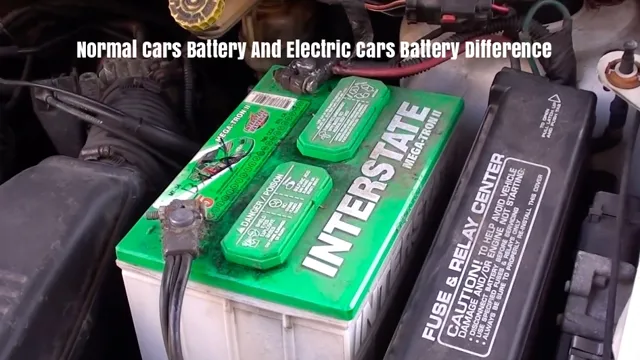
Normal car batteries contain toxic lead and acid
Normal car batteries can pose a significant environmental risk due to their lead and acid content. Lead is a toxic metal that can cause serious health problems, especially in children and pregnant women. Acid, on the other hand, is corrosive and can cause harm to living organisms and ecosystems if it leaches into the soil or water supply.
Many car batteries end up in landfills, where they can release these harmful substances into the environment. However, it’s important to note that there are alternatives available that are much safer and environmentally friendly. For instance, lithium-ion batteries are becoming increasingly popular due to their lower environmental impact compared to lead-acid batteries.
By choosing a more eco-friendly battery, you can help reduce the impact of your vehicle on the environment and protect the planet for future generations.
Cost
When it comes to the cost of an electric car battery versus a normal car battery, the difference can be significant. While a standard car battery can run between $50 to $200, depending on the brand and type, an electric car battery can cost thousands of dollars. This is due to the larger size and capacity needed to power an electric vehicle.
However, it’s important to note that an electric car battery can last much longer than a standard car battery, potentially lasting up to ten years before needing to be replaced. Additionally, the cost of electricity to charge an electric car battery is generally much cheaper than the cost of gasoline for a traditional car. So, while the upfront cost of an electric car battery may be higher, the long-term savings in fuel costs can make it a worthwhile investment.
Electric car batteries are initially more expensive
When it comes to electric cars, many people are hesitant to switch over because electric car batteries are initially more expensive. It’s true that the upfront cost of an EV battery can be significantly higher than a traditional car battery. However, it’s important to consider the overall lifetime cost of ownership.
Electric cars have lower maintenance costs and operating costs because they don’t require gasoline and have fewer moving parts than traditional cars. Plus, as battery technology continues to improve, the cost of EV batteries is expected to decrease over time. So while EV batteries may be more expensive at first, in the long run, they can save you money and help reduce your carbon footprint.
Normal car battery replacement costs add up over time
When it comes to car maintenance, battery replacement costs are often overlooked. However, these costs can quickly add up over time. Normal car batteries have a lifespan of 3-5 years, so if you keep your car for longer than that, you will likely have to replace the battery multiple times.
Depending on the make and model of your car, a single battery replacement can cost anywhere from $100 to $300. That’s a significant expense, especially if you have to do it every few years. It’s important to keep this in mind when budgeting for car maintenance and make sure you’re prepared for these costs.
By staying on top of battery maintenance and replacing your battery as needed, you can avoid unexpected breakdowns and save money in the long run.
Performance
When it comes to performance, electric car batteries have a significant advantage over normal car batteries. Electric car batteries provide instantaneous torque, providing maximum power immediately, whereas conventional car batteries take some time before they can reach their peak power output. This results in a noticeable difference in acceleration between the two types of cars.
Moreover, electric car batteries are more efficient than regular car batteries, allowing electric vehicles to travel longer distances on a single charge. Electric cars also tend to have a lower center of gravity, which improves handling and stability on the road. In contrast, gasoline-powered vehicles have more moving parts, which can result in more frequent breakdowns and maintenance issues.
So, while there are certainly advantages to owning a gasoline-powered car, it’s hard to deny that electric cars provide superior performance.
Electric car batteries have instant torque and smoother acceleration
One of the most noticeable advantages of electric car batteries is their superior performance. Electric vehicles are faster and smoother compared to their gasoline counterparts, thanks to their instant torque and smoother acceleration. Unlike traditional engines that require time to build up power, electric cars offer instantaneous response and an immediate rush of power the moment you press on the pedal.
This feature not only provides an excellent driving experience but also helps drivers navigate through traffic with ease. The responsiveness of electric vehicle batteries is truly remarkable, giving electric cars an edge over other vehicles on the road. The immediate power transfer also enhances the overall efficiency of the electric car, making it a smart choice for eco-conscious drivers.
With electric car batteries, you get the power you need when you need it, making your driving experience a thrilling and exciting one.
Normal car batteries have limited range and slow acceleration
When it comes to electric cars, performance is often a question mark for many people. And rightly so – normal car batteries have limited range and slow acceleration compared to their gasoline-powered counterparts. This is because electric cars are powered by big, heavy batteries that can’t provide the same power as a traditional engine.
However, recent advancements in battery technology have led to improvements in electric car performance. Lithium-ion batteries, for example, are lighter and more energy-dense than other types of batteries used in electric cars. This means that electric cars using these batteries can have better range and acceleration.
Another factor in electric car performance is their electric motors. Unlike gasoline engines, electric motors have instant torque, meaning they can provide full power from the moment you step on the accelerator. This translates to faster acceleration and a more engaging driving experience.
So while early electric cars may have had limitations in performance, the latest generation is proving that electric cars can be just as fun and capable on the road as their gasoline counterparts.
Maintenance
When it comes to maintenance, electric car batteries have a clear advantage over normal car batteries. They require less maintenance overall, as there are fewer moving parts and fluids to contend with. This means fewer trips to the mechanic and less money spent on servicing the car.
Additionally, electric car batteries tend to last longer than traditional car batteries, which can sometimes require replacement every few years. However, it’s important to remember that electric car batteries still require some basic maintenance, such as regular charging and occasional inspections to ensure everything is working properly. But, overall, the reduced need for frequent maintenance makes electric cars an attractive option for those looking for a low-maintenance vehicle.
Electric car batteries require less maintenance, no oil changes
When it comes to electric cars, one of the biggest perks is the lack of maintenance required. Unlike traditional gasoline-powered vehicles, electric cars don’t require oil changes. This is because electric motors use a different type of lubricant, which doesn’t break down or need to be changed as often.
Additionally, electric car batteries typically require less maintenance overall. They don’t have the same parts as a traditional engine, like spark plugs or a timing belt, that need to be replaced periodically. As long as you keep up with general maintenance, like tire rotations and brake checks, an electric car can be a relatively hassle-free vehicle to own.
Plus, this means fewer trips to the mechanic and more time and money saved in the long run. So, if you’re looking to simplify your life and reduce your environmental impact, an electric car might be the way to go.
Conclusion
In a world where we are constantly looking for ways to reduce our carbon footprint, electric cars seem to be the answer. But what about their batteries? Well, let’s just say they’re not your average car battery. These high-tech powerhouses require advanced materials and innovative engineering to deliver the range and performance that we demand.
So, while a regular car battery might get you from A to B, an electric car battery will take you further, faster, and in a much more sustainable way. It’s time to say goodbye to fossil fuels and embrace the power of the electric car battery. Trust us, once you’ve experienced the joys of electric driving, you’ll never want to go back to your old gas guzzler.
“
FAQs
What is the difference between an electric car battery and a normal car battery?
An electric car battery is larger and more powerful than a normal car battery, as it is responsible for powering the entire vehicle, whereas a normal car battery is only responsible for starting the engine.
How long does an electric car battery last compared to a normal car battery?
An electric car battery can last for up to 300 miles on a single charge, whereas a normal car battery will last for several years without needing to be replaced, but is not responsible for powering the entire vehicle.
How much does it cost to replace an electric car battery compared to a normal car battery?
The cost to replace an electric car battery can range from $3,000 to $10,000, whereas a normal car battery typically costs less than $200 to replace.
Can an electric car battery be recycled like a normal car battery?
Yes, both electric car batteries and normal car batteries can be recycled. However, the process for recycling an electric car battery is more complex due to the size and power of the battery.
